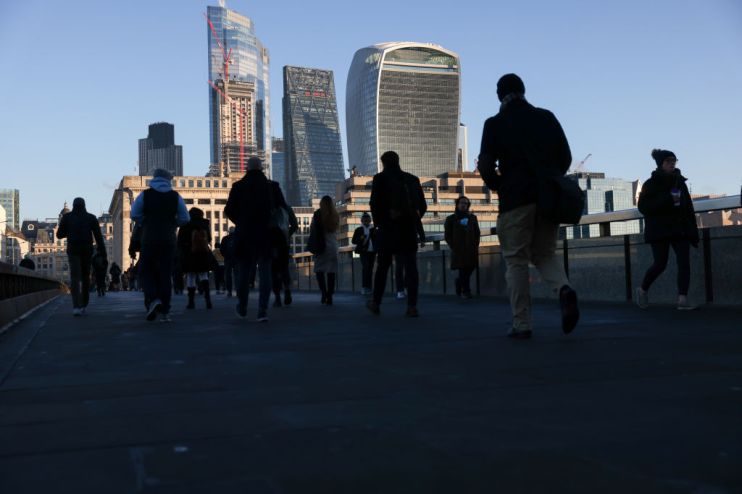Cost of living crisis: High earners with salaries of at least £50k offered more and greater pay rises

High earners are most likely to have been offered pay increases as the rising cost of living begins to bite, according to new research shared with City A.M. this morning.
As inflation grew to its highest level in three decades and 22 million households brace themselves for soaring energy bills, a YouGov survey carried out on behalf of global job site Indeed found triple the number of those financially comfortable (19 per cent) have been offered a pay rise recently to help with the increasing cost of everyday living compared to those who are financially uncomfortable (6 per cent).
Furthermore, those with the lowest incomes are mostly receiving the smallest pay increases, whereas by contrast, those with the highest incomes are mostly receiving the biggest pay hikes.
Nearly one in three of those that are financially uncomfortable say their money situation has become worse in the last year and 64 per cent expect their situation to deteriorate in the next 12 months. In comparison, just 22 per cent of those that are financially comfortable have experienced a decline in their financial situation.
The disparity comes amidst predictions of the biggest decline in living standards since the 1950s and the survey points towards a crisis that is already hitting hard.
More than one in ten (11 per cent) Britons are struggling to make ends meet while 29 per cent said they often do not have money for anything beyond essentials with some (1 per cent) frequently going without food and heating.
High earners bag biggest pay hikes
Looking at gross household income, 11 per cent of those earning below £25,000 have been offered a pay rise to support them during what has been the fastest price increase of everyday items in 30 years.
In comparison, 20 per cent of those earning £100,000-£149,999 and 23% of those with an income of £150,000 or more having been offered a raise.
In fact, only 5 per cent of those with an income of £5,000-£9,999 and 7 per cent of those with an income of £10,000-£14,999 have been offered an increase in wages.
| Income | Average (mean) pay rise |
| £10k – £24,999 | 3.3% |
| £25k – £49,999 | 4.9% |
| £50k – £99,999 | 5.2% |
| £100k – £149,999 | 5.1% |
| £150k and above | 5.4% |
Not only are higher earners more likely to receive pay increases, they’re also receiving the biggest jumps in pay. For example, of those earning under £25,000 just 5 per cent have been offered a salary rise greater than 7 per cent – to surpass inflation – in comparison to those earning £100,000-£149,999 where 30 per cent were offered more than 7 per cent, and for those earning £150,000 or more, 31 per cent were offered a pay rise greater than 7 per cent.
Employer support
As a result of the rise in the cost of living, many companies are considering how they can better support their employees; 15 per cent of staff have been offered pay rises specifically with the cost of living in mind and one in four (25 per cent) other benefits.
Those companies which have offered pay rises will be rewarded too; more than half of employees (52 per cent) said a pay rise at this time would make them feel more loyal to their employer.
However, respondents’ opinions of support vary depending on financial circumstances.
Nine out of ten (90 per cent) of those financially comfortable feel subsidising travel costs is effective at supporting staff to manage increasing outgoings, in comparison to just 54 per cent of those financially uncomfortable.
The results are similar for offering permission to work from home more (74 per cent vs 47 per cent), discount and voucher schemes (52 per cent vs 35 per cent) and working fewer hours for the same pay (85 per cent vs 68 per cent).
The only workplace offering – aside from pay rises – that was valued highly and fairly consistently regardless of financial situation, was improved benefits, such as childcare support, pensions and parental leave. 80 per cent of the financially comfortable and 74 per cent of the financially uncomfortable felt it was effective in supporting staff to manage the rises in everyday item prices.
“The cost of living is one of the biggest concerns for Britons and while some workers have seen inflation-busting pay rises driven by worker shortages, the stark reality for many is that their pay simply isn’t keeping pace,” said Jack Kennedy, UK economist at Indeed.
“With inflation predicted to continue to rise, more and more people face being sucked into uncertainty with low earners bearing the brunt of diminished real earnings.”
Jack Kennedy
“As well as the discrepancies between higher and lower earners’ prospects, our survey also shines a light on the human toll of spiralling costs with many people being forced into desperate positions.
“Encouragingly, some companies are investing in helping staff through these difficult times but the crisis is severe and many of those who need the most support aren’t receiving it,” Kennedy added.
“The fact that such a huge proportion of those financially uncomfortable do not feel supported by their employer is a red flag for businesses.
“The problem is that many companies are still emerging from the ravages of the pandemic and not all will be in a position to bump employee pay,” he continued.
“To understand which benefits employees value and learn more about the ones that could help improve wellbeing as well as personal finances, a good place to start is by asking question,” Kennedy concluded.